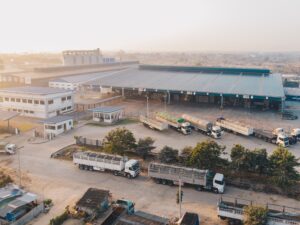Suneet Gupta, Global Head, Kale Logistics Solutions, explores AI’s transformative impact on logistics, enhancing efficiency and decision-making. From real-time tracking to automated warehouse operations, AI propels the industry towards a more intelligent future.

AI transforms logistics, automates warehouse operations, unlocking vast automation potential
Suneet Gupta elucidates that AI is transforming the logistics industry from a reactive to a proactive one, enhancing efficiency, optimising resource allocation, and enabling data-driven decision-making. As AI technologies continue to evolve, we can expect even more intelligent and dynamic logistics solutions in the future. Demand forecasting, route optimisation, data accuracy management, and seamless warehouse management are some of the key areas where predictive analytics and machine learning can play a major role.
Tracking excellence
AI-powered systems revolutionise real-time tracking in logistics, particularly in air cargo for perishables and pharmaceuticals. Automated temperature monitoring ensures precise transit conditions, enhancing operational visibility and customer satisfaction with timely pre-alerts to relevant personnel.
Automated evolution
AI technologies are swiftly reshaping warehouse operations and logistics, offering significant automation potential. Robotic Process Automation (RPA) enhances efficiency by automating tasks like data entry and order picking, reducing errors, and saving time. AI-integrated warehouse management systems optimise inventory, track shipments, and automate tasks, enhancing cost efficiency and supply chain visibility. This AI-based automation is extending its transformative impact from e-commerce to diverse sectors such as manufacturing, healthcare, agriculture, and energy, universally streamlining logistics and inventory management.
Data dynamics
In the logistics industry, AI-collected data transforms decision-making and boosts operational efficiency. Companies continually innovate, leveraging this data for enhanced automation. As AI technology evolves, anticipations rise for more significant advancements in data-driven logistics transformations. AI-collected logistics data plays a pivotal role in improving decision-making and operational efficiency.
- Business Intelligence Platforms utilise AI to analyse data, offering logistics managers insights for informed decisions on pricing, staffing, and resource allocation.
- Automated recommendations from AI algorithms provide personalised logistics strategies, optimising operations.
- Additionally, AI’s Risk Management analyses data to proactively identify potential supply chain risks, enhancing resilience in the face of disruptions.
Regulations
Logistics regulations adapt to the integration of AI. Key compliance challenges include addressing bias and transparency in AI algorithms for fair and responsible use. Concerns about widespread deepfake usage prompt governments to enact policies ensuring ethical AI practices in logistics and warehouse management.
Workforce transition
Initially feared as a job threat, ChatGPT is now empowering individuals, transforming the way they work, and enhancing efficiency. Likewise, AI’s impact on logistics is poised for positive change. As awareness grows, people will recognise AI’s capacity to simplify and optimise their roles. Acquiring basic technical knowledge about AI becomes essential, evolving into core expertise over time. The initial apprehension will likely give way to the realization that AI can significantly contribute to making jobs more accessible and efficient.











